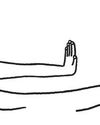
Previously unpublished work casts new light on Taubes, who killed herself in 1969.
In Sigmund Freud’s “Rat Man,” a case history of a neurotic young man, there is a curious footnote about the natural uncertainty of paternity. For a man to believe that his father truly was his father, he had to accept what no evidence could corroborate. Paternity was not a physical relation, Freud explained. It was an idea that sprang, as if already fully formed, from one’s mind. “The prehistoric figures which show a smaller person sitting upon the head of a larger one are representations of patrilineal descent,” he wrote. “Athena had no mother, but sprang from the head of Zeus.”
But Freud was wrong. Athena did have a mother: Metis, whom Zeus swallowed, fearing that the children she bore would be too mighty for him to govern. In some versions of the myth, Metis, while pregnant inside Zeus, made her daughter a breastplate, which Athena eventually adorned with the decapitated head of the gorgon Medusa, whose eyes held the power to turn anyone who looked upon her into stone. “To decapitate = to castrate,” Freud wrote elsewhere. Had he put the two heads together, he might have wondered at the paradox they presented: that the fierce and divine female child could symbolize both the extension of the patriarch’s authority and its undoing.
This story is from the June 12, 2023 edition of The New Yorker.
Start your 7-day Magzter GOLD free trial to access thousands of curated premium stories, and 9,000+ magazines and newspapers.
Already a subscriber ? Sign In
This story is from the June 12, 2023 edition of The New Yorker.
Start your 7-day Magzter GOLD free trial to access thousands of curated premium stories, and 9,000+ magazines and newspapers.
Already a subscriber? Sign In

BADDIE ISSUES
\"Wicked\" and \"Gladiator II.\"

LET'S MAKE A DEAL
\"Death Becomes Her\" and \"Burnout Paradise.\"

ANTI HEROES
\"The Franchise,\" on HBO.

FELLOW-TRAVELLERS
The surprisingly sunny origins of the Frankfurt School.

NOW YOU SEE ME
John Singer Sargent's strange, slippery portraits of an art dealer's family.

PARIS FRIEND - SHUANG XUETAO
Xiaoguo had a terror of thirst, so he kept a glass of water on the table beside his hospital bed. As soon as it was empty, he asked me to refill it. I wanted to warn him that this was unhealthy - guzzling water all night long puts pressure on the kidneys, and pissing that much couldn't be good for his injury. He was tall, though, so I decided his insides could probably cope.

WILD SIDE
Is Lake Tahoe's bear boom getting out of hand?

GETTING A GRIP
Robots learn to use their hands.

WITHHOLDING SEX FROM MY WIFE
In the wake of [the] election, progressive women, who are outraged over Donald Trump's victory at the ballot box, have taken to social media with public, vengeful vows of chastity. - The Free Press.

DEADLINE EXTENSION
Old age, reborn.